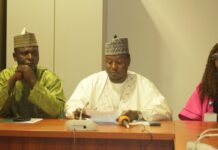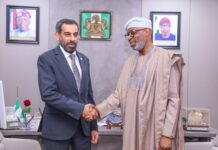A member representing Andoni/Opobo/Nkoro Federal Constituency of Rivers State Honourable Awaji – Inombek Abiante has called on Nigeria to emulate the example of Cape Verde by investing in education to curb the spate of religious intolerance in the country.
He was speaking on the sidelines of the ECOWAS Parliament Committees on Education, Science and Culture/ Health/ Telecommunication and Information Technology, in Praia, Capital of Cape Verde, which focused on theme: Religious Tolerance and Harmony; Essential factors to Development, Peace and stability in ECOWAS Region”.
93% of the Cape Verdean population are educated, a development the authorities attribute to one of the major factors responsible for religious tolerance in the country.
Situating Nigeria with Cape Verde, Abiante postulated that the high number of out of school children in Nigeria , may not be far from the reason for the high rate of religious intolerance in the country.
He therefore appealed to the government at all levels to make deliberate efforts in ensuring that education plays a vital role in the sociol economic development of the country.
“Some very obvious factors have been identified as the cause or drivers of religious intolerance in the region and basically, we have looked at education as a fulcrum towards reducing the challenge.
So if you situate that to the Nigerian experience, it is one record that we have one of the highest out of school population and if that is correct, then we don’t need to go very far to understand why we have the challenge of religious intolerance . So what we need to do is to put together all the resources that will enable us to migrate away from being tagged as one of the countries with the highest number of out of school children.
You have heard Cape Verde saying 93% of their people are educated, so if we achieve education for our people, understanding will improve and that will also propel tolerance”.
The lawmaker questioned the claim of Nigeria being a secular state when such was not applicable in practice. Again, he emphasised that such a situation could be corrected with education.
“Luckily for us we have also declared that Nigeria is a secular state, but how secular in practice is what we should be pushing for? We need to look at the perimeters and see if it guarantees secularity in practice because you cannot contradict yourself.
If you say the country is a secular state, while some States within that same country have laws that declare one religion superior to the other which has led to isolating some culture, isolating some practices, isolating some beliefs to the extent that certain things are considered taboo.
So a lot need to be done and you cannot achieve it by force, you cannot achieve it by fait, you can only achieve that by superior argument and the superior argument can only come when you are enlightened, when you are educated.”
On the allegation that politicians who are supposedly enlightened, were also one of the key drivers of religious intolerance, Abiante argued further that the solution still lies in educating the masses.
“Human nature itself seeks to take advantage of any situation. The enlightened mind may have seen the unenlightened and seeks to take advantage of him and manipulate him to sooth that purpose but if the category of the enlightened are much more than the unenlightened, whether you call it politicians, enlightened, educated or whatever, cannot manipulate with ease the person he seeks to take advantage of. So education still is the key. Education does not mean educating a very tiny minority.
It means educating the state, it means educating the people, educating the quantum that is required to propelled the desired understanding. So if a greater number of the citizens are enlightened, it will be very difficult to be manipulated”.
Some schools of thought have advocated for the domestication of laws as a measure to reduce the incidence of religious intolerance but the law maker was not at home with that position.
According to him, “it is not about law and declaration. It is not about domestication. For instance, we have so declared that we are a secular state. What secularity means is that no religion is superior to the other. Everybody has the same or equivalent latitude to practice his or her belief but how is it being implemented becomes the question.
There is even a contradiction in our own case where some states have enacted laws to promote certain religions, so it is not about laws. It is about the practice of the people. Is about conviction, it is about positive expression of what is right, positive expression of the capacity to tolerate, the capacity to accommodate, that is exactly what is required in this circumstance”.
On reason the Muslim – Muslim ticket by the ruling party for next year’s Presidential election has regenerated so much dust, compare to 1993 when Abiola and kingibe ran on the same religion platform, he said the dynamics of the country were different today.
“If you get to the narrative of today, do we have the same level of trust?. There is so much discontent, so much misunderstanding, so much finger pointing. Everybody wants to protect its own enclave, that is why you find all the challenges. If we have been very accommodating, maybe maybe not. So for today, it has been raised as an issue and it has remained an issue in the perspective of today’s Nigeria “.
Honourable Awaji – Inombek Abiante spoke on his take home lessons on the joint Committee meeting:
“on the lessons of Cape Verde, essentially , the major statistics of the country that is very admirable, very intriguing, very inviting, is the fact that, 93% of its population are educated, if that is the only lesson that l have taken home, that is enough. So it should propel me within my consistency to seek solution through education, get as much as possible, government ‘s attention, that is the attention of those who will execute the project; the attention to provide more schools, more classrooms, more infrastructure, more incentives to ensure and guarantee that people are in the classrooms, that people are educated and it is not just education for the sake of education, but education for the purpose of getting engaged because it is also dangerous to have people parading paper qualification without adding value to themselves and to the society. And one of the surest ways of achieving this, as far as l am concern, lies in getting back our technical and vocational education.
We have lost it!. In the seventies and early eighties when I went to school, we had vocational colleges, we had technical colleges. I still have people whose only education ended at the vocational colleges and till tomorrow they are equipped with the craft that they have used in training their children to the level they are training them today.
How did we lose all of that? We have drafted policies, the 6-3-3-4 system, we bought machines, we bought equipment to several schools, where are the equipment ? We just keep wasting resources. Probably, I think one of the challenges we have as a country is excess resources.
When you have something in excess, it also have its negative implication. let me tell you, as a young lady, you open your wardrobe, you have 200 different clothes!.
At first , you will be confused which one to wear to church on a Sunday, you can keep searching for the cloth that will best suit you till you run late. But if you see a lady who has only one or two clothes, and is determined to go to church, she will wash it overnight and before morning, it is already dry and she may be the first person to appear in church.
So, l think one of the problems we have in Nigeria is that God has blessed us excessively that we have become confused, we don’t even know how to utilize the resources to our benefit.
Maybe if God takes the resources away, we might begin to think and we will think properly”. END












































